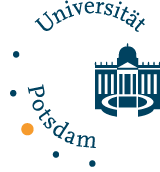Reflect - Improving competence assessments through pactical teaching and learning experiences in teacher education
Students teachers' self-efficacy beliefs and reflection competence are key prerequisites of effective and high-quality instruction. Particularly the practical phases in teacher education help systematically increase student teachers’ estimations of their own efficacy in teaching situations and their reflection skills via teaching observations and verbal feedback.
Against this background, our project aims to increase student teachers’ self-efficacy and reflection competence by giving them access to verbal feedback on their classroom teaching. This will include reflections based on video-recorded lessons and written notes from observers. The project will study the extent to which self-efficacy differs from reflection competence depending on the recording medium used for reflection.
Participating student teachers develop lesson plans in groups for a single subject in cooperation with teachers and research assistants and test these lesson plans in school classrooms.
In this project, we are interested in discovering how much video-based feedback can contribute to improving student teachers’ competence self-assessments.
Questions
- What role does video-based feedback play in student teachers’ reflection competence and self-efficacy assessments?
- How do student teachers’ self-efficacy assessments develop through practical experiences in schools?
Funding
The project will be funded by the Bundesministerium für Bildung und Forschung as a sub-project of the “PSI Potsdam (Professionalization-School Praxis Studies - Inclusion: Potsdam Model of Teacher Education)” from 2019 to 2022. Additional information can be found here.
Project duration and cooperation
The project will be funded from 01/2019 to 12/2022. The project works closely with the "Campus Schools" project at the University of Potsdam. Additional information can be found here.
Contact
Questions regarding the content of the study or administrative details may be directed to the project director Prof. Dr. Rebecca Lazarides and project assistant Frau Isabell Hußner via email:

